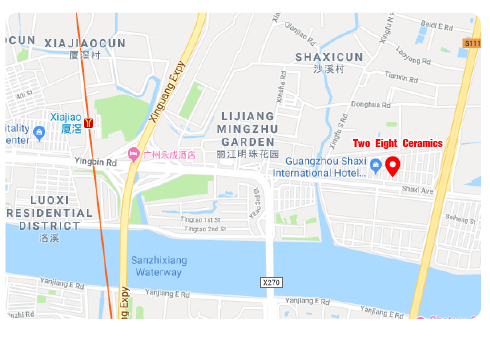Manufacturing process of alumina ceramics
Powder preparation The alumina powder entering the factory is prepared into powder materials according to different product requirements and different molding processes. The particle size of the powder is below 1μm. If high-purity alumina ceramic products are manufactured, in addition to the alumina purity of 99.99%, ultrafine pulverization and uniform particle size distribution are required. When extrusion molding or injection molding is used, a binder and a plasticizer must be introduced into the powder, generally a thermoplastic or resin with a weight ratio of 10-30%. The organic binder should be 150-200 with the alumina powder. Mix uniformly at temperature to facilitate the molding operation. The powder raw material formed by the hot pressing process does not need to add a binder. If semi-automatic or fully automatic dry pressing is used, there are special process requirements for the powder, and the powder needs to be processed by spray granulation to make it spherical, so as to improve the fluidity of the powder and facilitate the automatic filling of the mold during the molding. wall. In addition, in order to reduce the friction between the powder and the mold wall, it is necessary to add 1 to 2% of lubricants, such as stearic acid, and binder PVA. When dry pressing is desired, the powder needs to be sprayed and granulated, and polyvinyl alcohol is introduced as a binder. In recent years, a research institute in Shanghai has developed a water-soluble paraffin to be used as a binder for Al203 spray granulation, which has good fluidity under heating. The powder after spray granulation must have good fluidity, loose density, and flow angle friction temperature less than 30℃. Ideal particle gradation ratio and other conditions to obtain a larger green density. Molding methods The molding methods of alumina ceramic products include dry pressing, grouting, extrusion, cold isostatic pressing, injection, casting, hot pressing and hot isostatic pressing. In recent years, domestic and foreign molding technology methods have been developed such as filter press molding, direct solidification injection molding, gel injection molding, centrifugal grouting, and solid free molding. Different product shapes, sizes, complex shapes and precision products require different molding methods. Excerpt from its commonly used molding introduction: 1. Dry press molding: The dry press molding technology of alumina chinaware ceramic is limited to objects with a simple shape and an inner wall thickness of more than 1mm, and the ratio of length to diameter not greater than 4:1. The forming method is uniaxial or bidirectional. There are two types of presses: hydraulic and mechanical, and can be semi-automatic or fully automatic. The maximum pressure of the press is 200Mpa. The output can reach 15-50 pieces per minute. Due to the uniform stroke pressure of the hydraulic press, the height of the pressed part is different when the powder filling is different. However, the pressure applied by the mechanical press varies with the amount of powder filling, which easily leads to differences in size shrinkage after sintering, which affects product quality. Therefore, the uniform distribution of powder particles during dry pressing is very important for mold filling. Whether the filling amount is accurate or not has a great influence on the dimensional accuracy control of the manufactured alumina ceramic parts. The powder particles larger than 60μm and between 60-200 mesh can achieve greater free flow effect and better pressure forming effect. 2. Grouting molding method: Grouting molding is an earlier molding method used for alumina chinaware ceramic. Due to the use of plaster molds, the cost is low and it is easy to form large-sized and complex-shaped parts. The key to grouting is the preparation of alumina slurry. Water is usually used as the flux medium, and then the degelling agent and the binder are added, and the exhaust is exhausted after being fully ground, and then poured into the plaster mold. Due to the absorption of moisture by the capillary of the plaster mold, the slurry solidifies in the mold. When hollow grouting, when the mold wall adsorbs the slurry to the required thickness, the excess slurry needs to be poured out. In order to reduce the shrinkage of the green body, a high-concentration slurry should be used as much as possible. The alumina ceramic slurry also needs to add organic additives to form an electric double layer on the surface of the slurry particles so that the slurry can be stably suspended without precipitation. In addition, binders such as vinyl alcohol, methyl cellulose, alginate amine, and dispersants such as polypropylene amine and gum arabic must be added, all for the purpose of making the slurry suitable for grouting and molding operations.
In today's world, have risen to an unexpected level of Ceramic Dinnerware Sets. It has gained a lot of popularity and has come up with different kinds of variations in its content.
What are you waiting for? Don't you want to provide perfect support to Porcelain Dish Set? If yes, so, switch to catering serveware right away!
Guangdong Hosen Two Eight Ceramics Co.,Ltd has a number of producing line for producing catering tableware.
We believe in keeping the customers happy and providing them with porcelain dinnerware set at a very competent price.
The first machine to produce Ceramic Dinnerware Sets, the Porcelain Dish Set catering dishware was invented in Ceramic Dinnerware Sets in Porcelain Dish Set by Ceramic Dinnerware Sets and was subsequently improved.
Guangdong Hosen Two Eight Industrial Co.,Ltd. is a professional ceramic tableware manufacturer. It is committed to provide customers with one-stop purchasing service for hotel supplies and catering suppliers about 20 years by now. Sitemap
CONTACT US
Mobile: +86-18127955755 / 13694279549
E-mail: haoxin-2@28ceramics.com /
Office Address: 3/F-4/F, Shaxi International Hotel Supplies City, Shaxi Village, Guangzhou City, China
Factory Address: Ditou lndustrial Zone, Fengxi District, Chaozhou City, China

